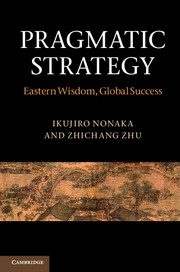Book contents
- Frontmatter
- Contents
- Figures
- Tables
- Cited classics
- Preface
- Part I Why pragmatism, why now?
- Part II What do pragmatic strategies look like?
- Part III What to do, how to do it?
- 5 Dealing with wuli–shili–renli
- 6 Timely balanced way-making
- 7 Orchestrating WSR, orchestrating the firm
- Part IV Think when we learn
- Notes
- References
- Index
7 - Orchestrating WSR, orchestrating the firm
Published online by Cambridge University Press: 05 June 2012
- Frontmatter
- Contents
- Figures
- Tables
- Cited classics
- Preface
- Part I Why pragmatism, why now?
- Part II What do pragmatic strategies look like?
- Part III What to do, how to do it?
- 5 Dealing with wuli–shili–renli
- 6 Timely balanced way-making
- 7 Orchestrating WSR, orchestrating the firm
- Part IV Think when we learn
- Notes
- References
- Index
Summary
Exploring ‘what to do, how to do it?’ in the last two chapters, we introduced wuli–shili–renli, a relational bottom line and timely balance a process mode for doing strategy. In this chapter, we invite readers to look at supporting skill sets which link managers’ jobs with firms’ existential purposes on the one hand and environmental complexity, ambiguity, uncertainty on the other. This is intended to help managers translate enduring Confucian wisdom into situated conducts. As to researchers, this chapter is directly related to fundamental questions in strategy, such as: what are firms, why are there firms, what are firms for, how do firms differ, how to run firms? Again, we draw from real-world business cases: Nintendo, Google, HP, IBM, Microsoft, Philips, YKK, Rolls-Royce, Huawei, Alibaba, Edison, Honda and more. Let us begin with managerial skill sets that are useful for creating and capturing value in the fuzzy, fast-moving business world.
SENSE IT, SEIZE IT, REALISE IT
Timely balanced strategies demand a broad set of entrepreneurial-managerial skills. For this, we found David Teece’s sensing–seizing–reconfiguring explication on dynamic capability useful. In many ways, the Teece framework is highly compatible with Ikujiro Nonaka’s ‘abilities of phronesis’. In the context and terminology of Confucian pragmatism, with a particular focus on timely balancing wuli–shili–renli we interpret the pragmatic skill sets as ‘sense it, seize it, realise it’ (Figure 7.1).
- Type
- Chapter
- Information
- Pragmatic StrategyEastern Wisdom, Global Success, pp. 276 - 322Publisher: Cambridge University PressPrint publication year: 2012



